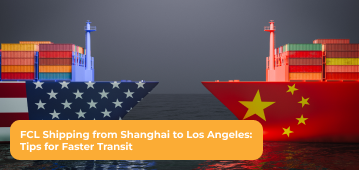Understanding Your Air Freight: 5 Elements of Air Shipping
In international trade, 90% of cargo is transported by sea, with only 0.5% transported by air. However, according to the International Air Transport Association, this insignificant volume of air cargo accounts for 35% of global trade in terms of value, or $6 trillion (IATA).
Given that air carriers take pride in their quick delivery and short transit times, the general rule in shipping is to ship time-sensitive cargo by air.
Freight vs Cargo
When discussing air shipping, two terms are frequently used: air freight and air cargo. They are incorrectly used interchangeably. However, the Business Dictionary defines air freight as “carriage paid for goods transported in an aircraft,” whereas air cargo is “goods transported by aircraft.”
The cost of shipping parcels, packages, and cargo is not a straight line. This inconsistency is caused by a variety of factors that influence their prices. If you ship goods regularly, you should be familiar with these elements. Knowing them can help you save money on shipping.
The following are some of the most common factors that will influence your air freight:
· Shipping Demand
According to economic theory, demand is one of the most powerful influences on the prices of goods and services. There is a “peak season” in the courier industry when demand for courier services is unusually high. Christmas, Valentine’s Day, Thanksgiving Day, and other holidays are included.
Because of the high demand during these seasons, most couriers can raise Air Freight prices. To avoid additional costs, ship only important or urgent packages during these times.
· Shipping Container
The type of shipping container you choose to hold your Air Freight cargo while it is in transit can affect the delivery cost. However, this can vary depending on the type of cargo you want to transport.
Fragile cargo necessitate special containers and handling. This is to ensure that your goods arrive safely at their destination. Services designed to meet these unique requirements are charged accordingly.
· Cargo Moving Skills and the Number of People Required
Additional charges apply if your cargo requires people with special skills to handle it while in transit. The more people are required to ensure proper handling and documentation of your merchandise, the higher the additional charges.
If your Air Freight cargo is too delicate or expensive, having someone oversee the shipment can help to avoid damage and unnecessary delays. If something goes wrong, both can cost money. Preventing them should be a priority in your strategic plan.
· Speed
Most freight forwarding companies emphasize speed as a competitive advantage. In many ways, this is true because time can mean the difference between profit and loss. However, you must consider the company’s efficiency and service quality. Speed means nothing if the goods you deliver or receive are not properly cared for or are delivered to the wrong people.
· Competition
This is the inverse of demand. This is most common during the off-season when there is an oversupply of courier service companies in a particular area or locality. This can benefit customers because many couriers are willing to lower their Air Freight prices to increase sales. Partnering with a reputable cargo courier could be a wise decision for your company.
The Benefits of Air Shipping
Ship by air if you need to move cargo quickly. Transit time by express air service or air courier is estimated to be 1-3 days, 5-10 days by any other air service, and 20-45 days by container ship. Customs clearance and cargo inspection at airports are also faster than at seaports.
· Reliability: Because airlines operate on strict schedules, cargo arrival and departure times are highly predictable.
· Security: Airlines and airports strictly control cargo, greatly reducing the risk of theft and damage.
Airline coverage is extensive, with flights to and from almost every destination on the planet. Furthermore, air cargo may be the only option for shipments to and from landlocked countries.
ECU360 allows you to generate quotes and book your LCL Air Cargo within minutes.
Like
Related Blogs

Electronics & Technology: Ensuring Safe FCL Shipping Across Borders

FCL Shipping from Shanghai to Los Angeles: Tips for Faster Transit



We stumbled over here coming from a different page and thought I should check
things out. I like what I see so now i’m following you.
Look forward to finding out about your web
page repeatedly.